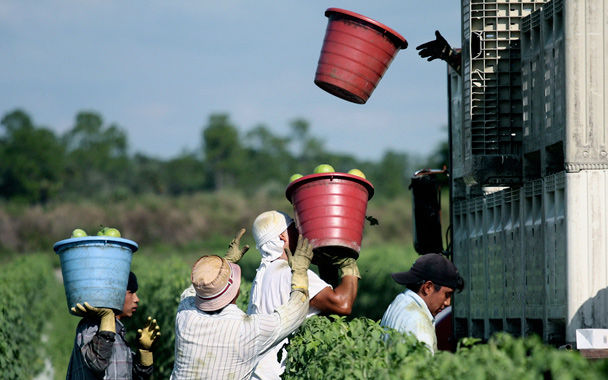A little slavery is okay, just not too much of it.
At this writing, that appears to be the official government position in the state of Florida, and it could explain why the fields of the Sunshine State provide such fertile ground for modern-day slavery. In the past dozen years, police have broken up and prosecuted seven slave operations there, freeing more than 1,000 men and women who were kept captive and forced to work for little or no money and threatened with death if they tried to escape. (For more on the plight of the Florida tomato pickers, see my article “The Price of Tomatoes” in the March 2009 issue of Gourmet.)
Late last year, two members of the Navarrete family, the operators of what has been recognized as the most brutal slave ring the state has seen, were sentenced to 12 years in prison; two others received lesser sentences. Justice having been done, it was an ideal opportunity for Governor Charlie Crist, who enjoys a very high approval rating, to spend a bit of that political capital to condemn the practice and announce bold steps to prevent it.
But Crist declined to comment, delegating that chore to a spokesman from the Department of Agriculture who told a reporter at the Ft. Myers News-Press, “Of course, I say any instance is too many, and any legitimate grower certainly does not engage in that activity. But you’re talking about maybe a case a year.”
If the governor really feels that any instance is too many, you would think he would be interested in at least talking with leaders of the Coalition of Immokalee Workers (CIW), a grassroots organization of farm laborers whose inside knowledge has been instrumental in exposing at least a half-dozen slavery organizations. But when the CIW asked for a meeting two years ago after an earlier slavery case, the governor “was not available at the time,” according to an email sent to me by Sterling Ivey, his press secretary.
Nor did he find any available time over the ensuing 18 months, despite requests from a personal friend, dozens of prominent human rights and religious groups, and thousands of ordinary citizens who wrote or emailed him on behalf of the CIW.
Earlier last week, the coalition once again requested a meeting with Crist to “discuss human rights abuses, including modern-day slavery among farmworkers in Florida.” That request is now being “reviewed and considered,” said Ivey.
To encourage the governor, the CIW has given him a March 9 deadline for coming to the table. If he doesn’t, they promise a “creative action” that will bring the conditions in south Florida’s tomato fields to the corridors of power in Tallahassee, the state’s capital, where the group promises to re-enact some of the abuses described in court documents from the Navarrete case. A short list of those abuses includes people being beaten, shackled in chains, locked in the back of box trucks without sanitary facilities, and robbed of their paychecks—none of which seem like the sort of images that Florida officials want broadcast on the nightly news.
Crist’s deafening silence comes at a time when other powerful folks who initially refused to play ball with the CIW have learned that it is in their best interest to join its anti-slavery campaign: After years of lobbying, pressure tactics, and “creative actions,” the CIW convinced several fast-food corporations to support efforts for higher pay and better working conditions for tomato workers and to have “zero tolerance” for slavery. Following the Navarrete case, some of those companies have stopped dealing with the tomato producers who did business with the slavery gang, and others have insisted that their suppliers take concrete steps to make sure no more slaves harvest their tomatoes—or else. “What side of the issue is Governor Crist going to be on?” asked Greg Asbed of the CIW, in a telephone interview. “If a month from now another slavery case goes to trial—and that may well happen—he’s got to think about the reaction to that.”
We’ll know what the governor thinks within the next week or so.




 Pinterest
Pinterest


